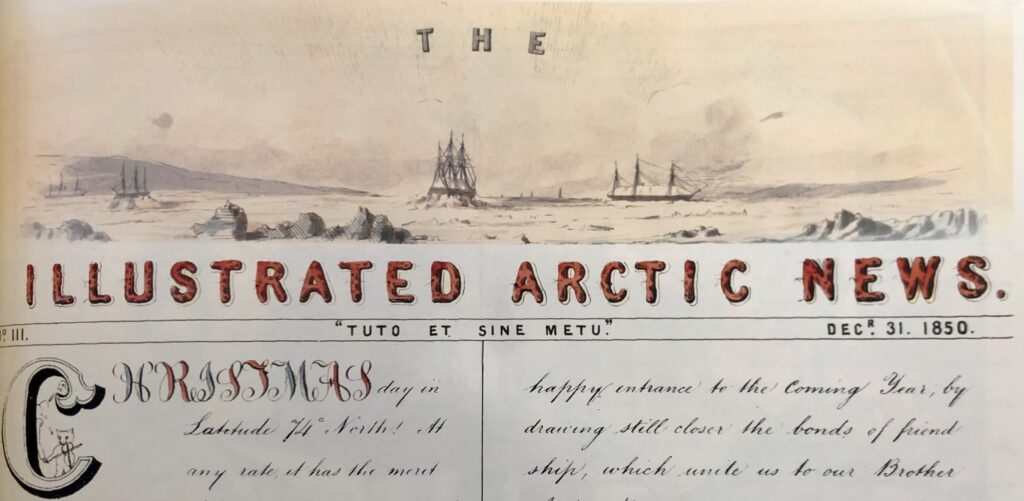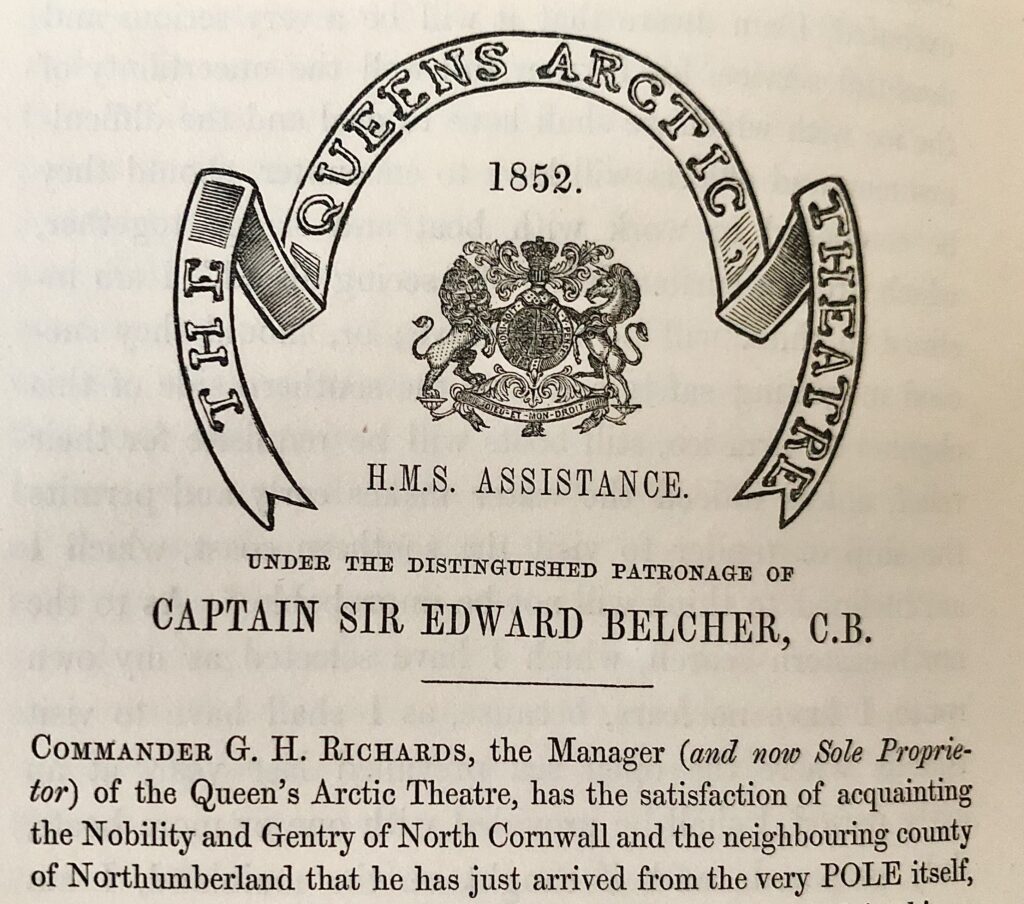The hearty explorers fighting to keep their spirits up throughout the dark months of the winters remind me of how we are all trying to keep our spirits up through our dark Covid winter. From my new manuscript:
“Between Christmas and New Year’s Eve the men and officers resumed daily chores including working on their spring traveling gear. The carpenters rigged an electric telegraph between the ships so, even in the worst of snowstorms, they could stay in contact with each other. Midweek Nares gave his lecture about wind. On New Year’s Eve, Kellett invited the officers to his cabin for supper, where they toasted the health and happiness of their wives and sweethearts, families and friends. At midnight everyone from both ships gathered at the highest point of Dealy Island where they raised a flag and set off two rockets.
The Resolutes and Intrepids greeted New Year’s Day with a band of flutes and fifes, accordion, drum, tambourine and triangle. The warmth of the celebrations was in direct contrast to the falling temperature: the lowest reading yet ushered in the new year. On 2 January 1853 the mercury froze, and by the 4TH the thermometer stood at -48°F. McDougall cheered the men by giving his geology lecture in a humorous manner. (Anyone who’s capable of making such a dry subject funny must be quite a wag.) On 14 January the Intrepids entertained everyone again with songs and recitations, accompanied by conjuring tricks and followed with a gunroom supper. On 1 February, after much anticipation the Arctic Theatre Royal reopened with two plays: King Glumpus, performed by the officers, and Raising the Wind, performed by the men. De Bray recalled in his journal he had never been so cold as when he performed in ladies’ clothes with his feet in thin satin slippers.
The costumes of Miss Durable and Peggy in Raising the Wind were truly admirable; all the articles were manufactured onboard, from the stays of number eight canvas, and laced with marline, to the black silk mantle and hood, with its crimson silk lining vying with the rouge on their cheeks. Miss Durable was perfection’s self, barring the ankles…Peggy was also capital, as far as costume and appearance went, and could she only have remained still, would perhaps have been the better of the two; but alas! There was a certain swagger and rolling in her gait, which would have brought down roars of applause…but certainly didn’t add to the ladylike appearance of a lovely, retiring, and accomplished girl yet in her teens, particularly when backed by a hitching up of the frock with both hands, as sailors occasionally do to the waistband of their trousers.
King Glumpus by John Barrow, Jr. followed an interlude of songs and recitations. The ‘women’ in this play wore masks and extravagant dresses, complete with bustles. McDougall’s ‘…faithless spouse [De Bray] wore a bloomer costume, such as is…worn by decoy bar girls in London as an inducement to very young men to expend a certain amount of capital in a glass of beer.’ [From McDougall’s Eventful Voyage of HMS Resolute]
Many thought Nares’ Queen, complete with coronet, could’ve been mistaken for Boadicea. The men truly suffered for their art: even within five feet of the stove the temperature was -5° F. The ‘women’ felt it the most and drank hot whiskey punch to keep warm. Off stage their unladylike postures included extending their legs over the heating stove. After the last curtain-call the officers dined in Intrepid’s gunroom, and the men’s supped in the mess.
After the carpenters dismantled the stage, the men returned to spring sledging preparations. The shoemakers made boots, the sailmakers robes and tents; each man made his traveling costume. The lectures resumed with McDougall’s about Arctic exploration, Nares’ lecturing on mechanics and how pulleys and levers work. Men studied various subjects alone like navigation and maths. One noble soul planned to read the whole ten volume Encyclopaedia, but gave up after the first two. Some men played games of draughts (checkers) and chess; and of course, Kellett required daily exercise. No Arctic hardship was more strongly felt than the loss of light for months. The plays, work, lecture games, exercises,…all lightened that burdensome darkness.”
30 January 2021 blog post carries on from above:
The Resolutes and Intrepids spent the rest of the dark winter attending lectures and preparing their travelling gear, while Kellett and McClintock organised the spring sledging parties. Over the course of the spring and summer they would spread across Melville Island, painstakingly searching every coastal indentation for any signs of the Franklin men, or Collinson and his Enterprises. However, the very first sledging party Kellett would send out was going to find McClure and his men on Investigator. He hoped they were still where their 1852 message had said they were. This is a passage from my manuscript which describes the finding of that message in autumn 1852:
“Most excitingly, Mecham and his men arrived at camp six days after Pim with great news. After being away twenty-two days laying out cairns, Mecham found a cylinder from McClure under a sandstone boulder. Containing a chart of his discoveries, it informed whomsoever found it the Investigators were wintering in Mercy Bay. With no updated materials Kellett correctly assumed they were still there. Resolutes and Intrepids wanted to leave immediately, but, because it was too late in the season, Kellett made the extraordinarily difficult decision to keep everyone in camp. McClure’s Investigators would have to survive till spring before receiving help from him. Kellett vowed to send the very first team to Mercy Bay in spring.”
McClure and his men were indeed still in Mercy Bay, and their plight was worsening by the hour. In tomorrow’s blog I will address McClure’s efforts to find Franklin and their desperate situation, and following that how Kellett rescues them in the spring of 1853.

